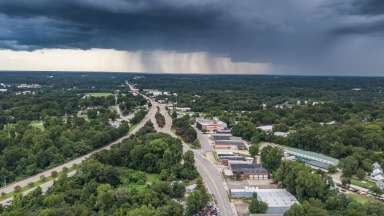Hurricanes are among nature’s most powerful and destructive phenomena. On average, 12 tropical storms, six of which become hurricanes, form over the Atlantic Ocean, Caribbean Sea, or Gulf of Mexico during the hurricane season, according to the U.S. National Oceanic and Atmospheric Administration. The season runs from June 1 to Nov. 30 each year.
By knowing what actions to take before the hurricane season begins, when a hurricane is in your area, as well as what to do after a hurricane leaves your area, you can increase your chance of survival.
Before
For months, weeks and days before a hurricane there are things you can do to make sure you have the right supplies and have taken the correct precautions.
- Have an emergency kit ready: drinking water, batteries, flashlights, food for three days, medications, and first aid kit.
- Keep your phone charged, car fueled and have extra cash on hand.
- Check the City of Raleigh’s website, listen to the radio, or watch TV for information.
- Bring in all outdoor furniture, decorations, garbage cans and anything else that is not tied down.
- Ensure a supply of water for sanitary purpose such as cleaning and flushing toilets. Fill the bathtub and other larger containers with water.
- Prepare to cover all windows and doors with shutters or other shielding materials. Reinforce your garage doors.
- Turn off utilities and propane tanks.
During
If a hurricane watch or warning has been issued there are several actions you should take.
- If told to evacuate, do so immediately. Do not drive around barricades.
- If sheltering during high winds, go to a FEMA safe room, storm shelter or a small, interior, windowless room or hallway on the lowest floor that is not subject to flooding.
- If trapped in a building by flooding, go to the highest level of the building. Do not climb into a closed attic. You may become trapped by rising flood water.
- Listen for current emergency information and instructions.
- Use a generator or other gasoline-powered machinery outdoors ONLY and away from windows.
- Do not walk, swim or drive through flood waters. Turn around, don’t drown! Just six inches of fast-moving water can knock you down and one foot of moving water can sweep your vehicle away. Heed Flood Warning Signs posted in flood-prone areas.
Learn about the difference between a watch and warning.
After
- Check on friends and neighbors.
- Listen to authorities for information and special instructions.
- Be careful during clean-up. Wear protective clothing and work with someone else.
- Do not touch electrical equipment if it is wet or if you are standing in water. If it is safe to do so, turn off electricity at the main breaker or fuse box to prevent electric shock.
- Avoid wading in flood water, which can contain dangerous debris. Underground or downed power lines can also electrically charge the water.
- Save phone calls for emergencies. Phone systems are often down or busy after a disaster. Use text messages or social media to communicate with family and friends.
- Document any property damage with photographs. Contact your insurance company for assistance.
- Watch for fallen power lines and trees. Do not go near a fallen power line! Report them to Duke Energy Progress at 800-452-2777.
- Contact Raleigh’s Solid Waste Services Department for information on storm debris removal.
